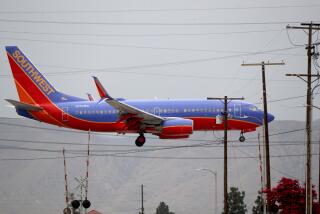No Signs of Letup in Employee Travel
- Share via
Despite all the hype about videoconferencing and concerns over rising travel costs, more Americans are traveling on business than ever, according to results released Tuesday from American Express Co.’s biennial survey of business travel practices.
“We estimate that U.S. companies will spend $156 billion on travel and entertainment this year, up from $150 billion in 1995,” said Ed Gilligan, president of American Express Corporate Services in New York.
Videoconferencing has become a tool for improving communications, not a replacement for travel, Gilligan said.
According to the survey, the number of travelers as a percentage of total employees grew from 21% in 1994 to 27% today. And the percentage of frequent travelers (those who take more than nine trips a year) increased from 7% of employees to 10%.
There’s definitely more travel going on, Gilligan said, and there’s no better proof than higher air fares. Air fares were up between 12% and 15% in September compared with a year ago. “Demand is growing faster than supply,” he said.
However, another study has shown that companies are finding ways to cut costs anyway. The Runzheimer survey of 218 companies found that although airline seats, hotel rates and car rental prices have increased in the last two years, the average domestic business trip in 1996 cost $958, just $1 more than the 1994 average.
“Prices of business travel have gone up, but companies have struggled to contain business travel expenses,” said Craig Lanza, who edited this year’s business survey for Runzheimer International, a management consulting firm in Rochester, Wis.
The increases in traveling and spending are resulting in some changes in corporate policies, which in turn are affecting the quality of life on the road for many business travelers.
“In effect, companies are treating travel less like a perk and more like any other corporate purchasing activity, subject to common-sense appropriations practices,” Gilligan said.
On the flip side, common sense appears to be driving a trend to reverse some of the restrictions travelers have complained about most loudly in recent years.
For example, many firms have given up trying to reclaim frequent-flier miles from employees who travel on the company dime. Only 4% of companies now require frequent-flier miles to be used for corporate travel, down from 9% in 1994.
Companies are relenting on upgrades as well. About 36% now let employees fly business class instead of coach on international flights, up from 31% two years ago. And 10% allow their employees to stretch out in business class on long-haul domestic flights, compared with only 5% in 1994.
“Making sure employees arrive fresh is worth the premium pay for upgrades,” Gilligan said.
This is especially true in international travel. The vast majority of those who travel internationally are now going business class, according to Thom Nulty, president of Associated Travel International, a Santa Ana-based travel agency that does about $300 million a year in corporate business. “In fact, the international traveler’s biggest problem is getting a business-class seat where he wants to go.”
Among other findings:
* A growing number of firms said they no longer exempt senior management from travel policies. Only 28% of firms said they have special policies for senior executives, down from 35% in 1994.
* Overall, frequent travelers are being asked to rent smaller cars, stay in more modest hotel rooms and fly the lowest logical air fare as often as possible.
The survey shows that only 19% of companies said deluxe rooms are the most commonly used rooms by travelers, compared with 28% two years ago. Indeed, two-thirds said they put travelers in moderate accommodations, and 14% said economy rooms were their most frequent choice, twice the level reported in 1994.
* A growing number of companies are imposing restrictions on rental cars. About 77% said employees were being asked to rent smaller cars, compared with 70% in 1994. On the other hand, only 41% asked them to fill up the cars before returning them, a drop from 63% two years before.
* The desire to use online booking services is increasing most rapidly with firms that have the largest travel budgets. Whereas 11% of all companies said they use online booking and 27% said they’d like to go online in the next year, about 60% of companies that spend more than $25 million a year on travel said they want to be online in the next year.
More to Read
Sign up for The Wild
We’ll help you find the best places to hike, bike and run, as well as the perfect silent spots for meditation and yoga.
You may occasionally receive promotional content from the Los Angeles Times.






